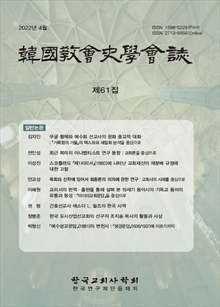간행물
韓國敎會史學會誌 KCI 등재 한국교회사학회지 JCHSK

- 발행기관 한국교회사학회
- 자료유형 학술지
- 간기 연3회
- ISSN 1598-5229 (Print)2713-9956 (Online)
- 수록기간 1979 ~ 2022
- 주제분류 인문학 > 종교학 인문학 분류의 다른 간행물
- 십진분류KDC 236DDC 260
권호리스트/논문검색
제19집 (2006년 12월) 11건
1.
2006.12
서비스 종료(열람 제한)
Peter Lombard wrote the Sententia which played the formative role in the theological education in the high Middle Ages. When he wrote it, he used the Psalm exegesis and Pauline exegesis which he lectured in the classroom. He established the systematic exegesis method in the preface of his exegesis. and kept the method consistently more than any other exegetes. And Peter offered a mode of reconciling discrepant readings of ancient fathers and contemporary theologians. When some disagreements are non capable of being reconciled, he offers his own reasonable suggestions for why one opinion should be preferred to another. Furthermore, he treated many theological sententia in his biblical exegesis. After theses sententia were used as the sources of his own Sententia.
His Sententia was superior to the theological systems which Abelard, Hug, and Gilberts made using the scholastic method in three ways. First Peter offers a coherent overall rationale for his schema. The thematic orientation that Peter gives to his work is the distinction between signs and things, use and enjoyment found in Augustine's De doctrina christiana. Second, the Lombard's handling of his Christian sources reveals a deep and broad reading, an acute and discriminating analysis of his authorities. And He read the latin translation of John of Damascus's works and accepts his eastern orthodox theology in his system. Third, He endows those terms such as essentia, substantia, natura, persona with a clear definition and solid contents and uses them consistently and overcomes the confusion around them. He resolved the problem of Abelard's trinity which attributes names power, wisdom, and goodness to the names of three persons indicating that the three names don't apply to the persons but to the essence of God. Therefore the estimation about Peter's Sententia which were the summa of existing opinions was groundless.
2.
2006.12
서비스 종료(열람 제한)
3.
2006.12
서비스 종료(열람 제한)
Historical Development of the Order of the List in the New Testament and Martin Luther's Reformation
4.
2006.12
서비스 종료(열람 제한)
5.
2006.12
서비스 종료(열람 제한)
6.
2006.12
서비스 종료(열람 제한)
7.
2006.12
서비스 종료(열람 제한)
8.
2006.12
서비스 종료(열람 제한)
9.
2006.12
서비스 종료(열람 제한)
10.
2006.12
서비스 종료(열람 제한)

